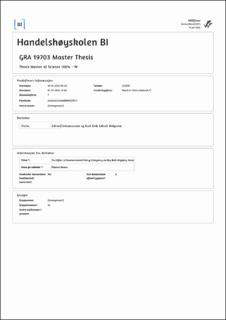The Effect of Environmental Policy Stringency on Dry Bulk Shipping Rates
Master thesis
Permanent lenke
https://hdl.handle.net/11250/3034762Utgivelsesdato
2022Metadata
Vis full innførselSamlinger
- Master of Science [1621]
Sammendrag
The shipping industry transports 90% of world trade, according to the International Chamber of Shipping. As climate change and sustainability becomes increasingly more topical, this industry’s pollution levels are now being carefully monitored. In recent years, regulation such as IMO 2020 has been passed, forcing shipowners to make costly modifications to their ships, or use more expensive fuels. This thesis analyses how these types of environmental policies and regulations affect dry bulk freight rates. We used the residuals from the return of green stock portfolios regressed on the return of a stock market index as a proxy to measure environmental policy stringency (EPS). From this we estimated impulse responses by the method of local projection. We found that an increase in EPS leads to an increase in dry bulk freight rates. Our results suggest sticky prices and that the effect is persistent up to a horizon of 24 months. The shock in EPS affects shipowners’ variable costs in terms of increased fuel and crew costs, and fixed costs through increased shipbuilding and scrapping costs.
Key Words: Environmental Policy Stringency, EPS, Shipping, Dry Bulk, Freight Rates, Transportation, Sea Freight, Bulk Shipping
Beskrivelse
Masteroppgave(MSc) in Master of Science in Business, Economics - Handelshøyskolen BI, 2022
